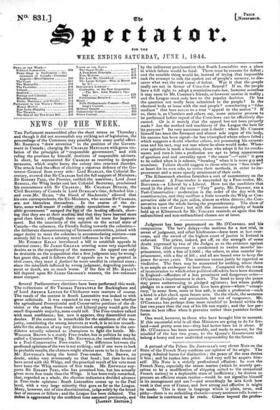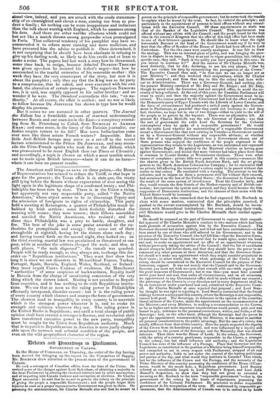A perusal of the Prince DE JoiNvtr.r.E's very clever Note
on the State of the French Navy confirms our opinion of its origin. The young Admiral burns fur distinction ; the peace of the seas denies it him ; and he rushes into print. And very well he acquits him- self. His Note is a strictly professional effusion : he sees the French Navy, especially the steam marine (which he acutely per- ceives to be a modification of shipping suited to the unnautical French nation) in a deplorable state of inefficiency ; he desires to procure an efficient steam marine—would he not signalize himself in its management and use ?—and accordingly be sets forth how weak is that arm of France, and how strong and effective it might be made. This is done in language which is plain, terse, and pithy—there is no enfeebling rhetoric—every sentence tells home— the reader is convinced as he reads. Glance beyond the profes- sional view, indeed, and you are struck with the crude statesman- ship of so clearsighted and clever a man, coming too from so pru- dent a family ; for nothing can be more inopportune and indiscreet than the talk about warring with England, which he assumes among his data. And there are other warlike allusions which could not but act like a match thrown among gunpowder when promulgated in Paris. That collateral tendency of his pamphlet may have re- commended it to others more cunning and more malicious, and have procured him the advice to publish it. Once determined, it is not surprising that he should have been obstinate in refusing to give up his darling work, so likely to do him credit and at least to make a noise. The papers had last week a story how he threatened, some time back, to resign, because Admiral DUPETIT-THOUARS was given up—how he resisted his father's anger—but how be succumbed to the tearful entreaties of his venerable mother this week they have the very counterpart of the story, but now it is about the pamphlet ; only they say that the King was so far party to a compromise, that he asked, and even executed with his own hand, the alteration of certain passages. The sagacious NEAIOURS WO, it is said, was angrily opposed to his sailor-brother: and no wonder if he were. The Standard contradicts this tale, "on au- thority." At all events, the affair is settled : and no war is likely to follow because Da JOINVILLE has shown in type how he would display his prowess. But it seems we are menaced in other quarters. The Journal des Debate has a formidable account of renewed understanding between Russia and our enemies in the East—a conspiracy extend- ing from St. Petersburg to Cabul, from NICHOLAS to ARHBAR KHAN; and once more, in the fancy of the Parisian journalist, our Indian empire totters to its fall ! Has some hallucination come over men like these astute French writers? Impossible. But a little Anti-British farrago may serve as a set-off to the recent lecture administered to the Prince DE JOINVILLE, and may recon- cile the Ultra-French spirits who took fire at the Debats, which was pronounced to be more English than our Times or Chronicle ; and accordingly, a topic is chosen on which a most terrible attack can be made upon British interests—where it can do no harm— where it can have no present results.



























